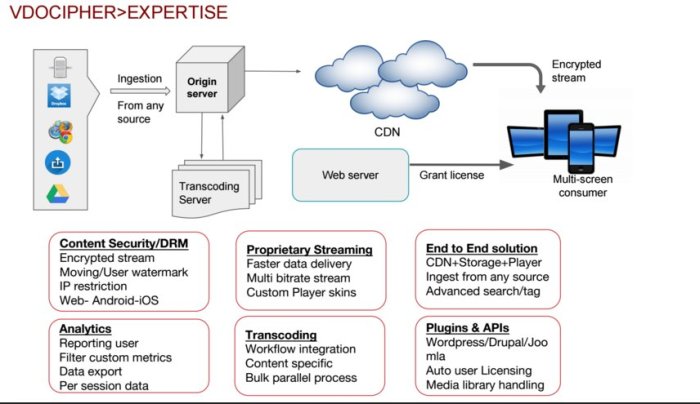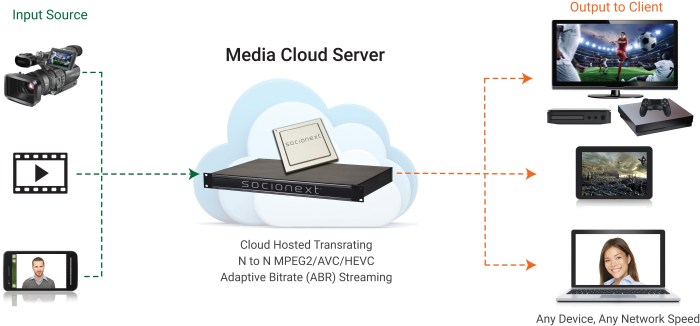Cloud hosting for video streaming: bandwidth and storage requirements are critical considerations for anyone seeking to deliver high-quality, reliable video content to a global audience. The demands of video streaming, with its reliance on constant data flow and vast storage capacity, present unique challenges that traditional hosting solutions often struggle to meet.
Cloud platforms, however, offer a scalable and flexible infrastructure capable of handling the immense bandwidth and storage needs of modern video streaming services.
This comprehensive guide delves into the intricacies of video streaming bandwidth and storage requirements, exploring the factors that influence these needs and providing practical insights for optimizing performance and managing costs. From understanding the relationship between video quality and bandwidth consumption to choosing the right storage solution for your specific streaming needs, this guide will equip you with the knowledge to make informed decisions and ensure a successful video streaming experience.
Cloud Hosting Options for Video Streaming

Now that you’ve got the bandwidth and storage sorted, let’s talk about the actual hosting platform. There are tons of cloud hosting providers out there, each with its own set of features and pricing. We’ll break down some of the big players and what they bring to the table.
Cloud Hosting Provider Comparison, Cloud hosting for video streaming: bandwidth and storage requirements
Choosing the right cloud hosting provider is key to ensuring your video streaming service runs smoothly and efficiently. Here’s a rundown of three major players: AWS, Azure, and Google Cloud.
- AWS (Amazon Web Services):AWS is a powerhouse in the cloud hosting world, offering a wide range of services, including video streaming. They have a robust infrastructure and a comprehensive suite of tools for managing and scaling your video streams. AWS’s pricing model is pay-as-you-go, which can be advantageous for fluctuating traffic.
- Azure (Microsoft Azure):Azure is another major player with a solid reputation for reliability and security. They provide a variety of video streaming services, including Azure Media Services, which offers features like content delivery networks (CDNs) and live streaming capabilities. Azure also offers a pay-as-you-go pricing model, similar to AWS.
- Google Cloud:Google Cloud has gained significant traction in recent years, offering competitive video streaming solutions with its Google Cloud Video API. Their platform provides features like transcoding, content delivery, and analytics. Google Cloud’s pricing is also based on usage, making it a flexible option for various streaming needs.
Advantages of Cloud Hosting for Video Streaming
Cloud hosting offers several advantages for video streaming:
- Scalability:Cloud hosting allows you to easily scale your infrastructure up or down based on demand. This means you can handle peak traffic without worrying about server overload.
- Cost-effectiveness:Cloud hosting providers typically charge on a pay-as-you-go basis, which can be more cost-effective than traditional server infrastructure, especially if your streaming needs fluctuate.
- Reliability:Cloud providers have massive data centers and redundant systems, which helps ensure your streaming service is highly reliable and available.
- Security:Cloud providers invest heavily in security measures to protect your data and applications.
- Global Reach:Cloud providers have a global presence, which means your content can be delivered quickly and efficiently to viewers around the world.
Disadvantages of Cloud Hosting for Video Streaming
While cloud hosting has many benefits, there are some potential drawbacks to consider:
- Vendor Lock-in:Choosing a specific cloud provider might limit your options in the future.
- Complexity:Managing and configuring cloud infrastructure can be complex, especially for those unfamiliar with cloud services.
- Security Concerns:While cloud providers have robust security measures, there’s always a risk of data breaches or other security incidents.
- Cost:While cloud hosting can be cost-effective, it can also become expensive if you’re not careful about managing your resources.
Cloud Video Streaming Services Comparison
Here’s a table comparing key features and pricing of some popular cloud video streaming services:
| Service | Features | Pricing |
|---|---|---|
| AWS Elemental MediaLive | Live video encoding, transcoding, and delivery. | Pay-as-you-go based on usage. |
| Azure Media Services | Live and on-demand video encoding, transcoding, and delivery. | Pay-as-you-go based on usage. |
| Google Cloud Video API | On-demand video transcoding and delivery. | Pay-as-you-go based on usage. |
| Wowza Streaming Engine | Live and on-demand video streaming, including features like real-time analytics and content management. | Subscription-based pricing with various tiers. |
| Kaltura | Comprehensive video platform with features like live streaming, video management, and analytics. | Subscription-based pricing with various tiers. |
Security Considerations for Cloud Video Streaming: Cloud Hosting For Video Streaming: Bandwidth And Storage Requirements

Streaming video over the cloud offers a ton of flexibility and scalability, but it also opens up some serious security risks. Think about it, your videos are basically hanging out in the digital ether, and you need to make sure they’re safe from prying eyes and nasty attacks.
Data Breaches and Unauthorized Access
Data breaches and unauthorized access are serious threats to cloud video streaming. These bad guys can steal your videos, use them for their own purposes, or even hold them hostage for ransom. Imagine the chaos if your latest viral video got leaked before its official release or if your customer’s private data was exposed.
Not cool, right?
Final Thoughts

Navigating the complexities of cloud hosting for video streaming requires a deep understanding of bandwidth and storage requirements. By carefully considering factors such as video resolution, frame rate, and storage capacity needs, you can optimize your streaming infrastructure for optimal performance and cost-effectiveness.
Cloud platforms offer a range of features and tools to manage bandwidth and storage, ensuring scalability and flexibility as your streaming audience grows. With the right strategies and solutions, cloud hosting can empower you to deliver a seamless and engaging video streaming experience to your viewers.

